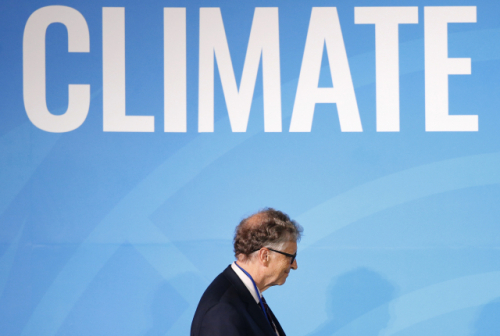Emphasizing in the new book’How to Avoid Climate Disaster’
“New reactors are safer and cheaper”
“Climate change is as fatal as Corona by mid-21C”
“Technology-policy-market cooperation is needed for clean energy”
“We should set the goal of 2050 as a carbon zero for a rich country”
 viewer
viewer
“A prime example of a (energy) policy that cannot keep pace with technology is the nuclear industry. Nuclear power is the only source of carbon-free energy that can be used almost anywhere, 24 hours a day. Newly developed reactors are safer and cheaper. But without the right policies and the right market, these next-generation reactor technology and science are useless.”
Engineer and environmentalist Bill Gates (66), the founder of Microsoft (MS), responded appropriately to the government’s policy on nuclear energy in his new book, Bill Gates, How to Avoid Climate Disaster (published by Kim Young-sa), published simultaneously worldwide on the 15th. Including this, they presented their own solutions for realizing a zero-carbon society.
Gates, who has not settled on the success and wealth achieved with MS, has been leading the global community’s problem solving such as poverty, disease, and the environment, said, “By the middle of the 21st century, climate change will be as deadly as Corona 19.” He said, “By 2100, the death rate will be five times greater.” He also warned, “In the next 10 or 20 years, the impact of climate change on the economy will be as serious as the pandemic of the size of Corona 19 occurs every 10 years.”
 viewer
viewer
In his book, he emphasized the need for a transition from a carbon civilization to a clean energy civilization, and emphasized the importance of the right role of the government in this process.
First, Gates stressed, “National leaders must have the right vision for transforming the global economy into a carbon economy,” he said. “This vision can lead to change in the behavior of people and companies. For example, it should play a role in regulating the total amount of carbon dioxide, linking the cost of climate change to financial markets, and playing a’big hand’ in investment in scientific research.
It also emphasized that the government’s policy should play a complementary role with the technology and the market. It is pointed out that even if innovative energy technologies are developed, if the government policy does not work together, the market will not be formed and eventually become useless.
 viewer
viewer
As a representative example, he pointed to TerraPower’s next-generation reactor technology, which he founded in 2006. “Some companies, such as TerraPower, are working on next-generation reactor designs to solve the problem of nuclear reactors that are more than 50 years old that we often see,” he said. It also produces less waste.” Gates added, “If the design of the next-generation reactor is not approved, the supply chain is not built, no next-generation nuclear power plant will be built unless there is a pilot operation to prove the new technology.”
He added, “If the government jointly invests in the design and technology of the next-generation nuclear power plant, it will certainly be helpful.” The only way to do it,” he emphasized again.
 viewer
viewer
Gates also found the importance of linking government policies, technologies and markets to biofuels. In the past, biofuel technology was still in its infancy in the U.S., but the government set high targets and the market was confused, and compared with the successful settlement of wind power and solar power in countries around the world, the reaction was disappointing.
In addition, Gates said, “The goal of achieving zero carbon as quickly as possible by 2050 in rich countries and immediately after 2050 in middle-income countries.” I have to make it.”
/ Reporter Jung Young-hyun [email protected]
< 저작권자 ⓒ 서울경제, 무단 전재 및 재배포 금지 >
